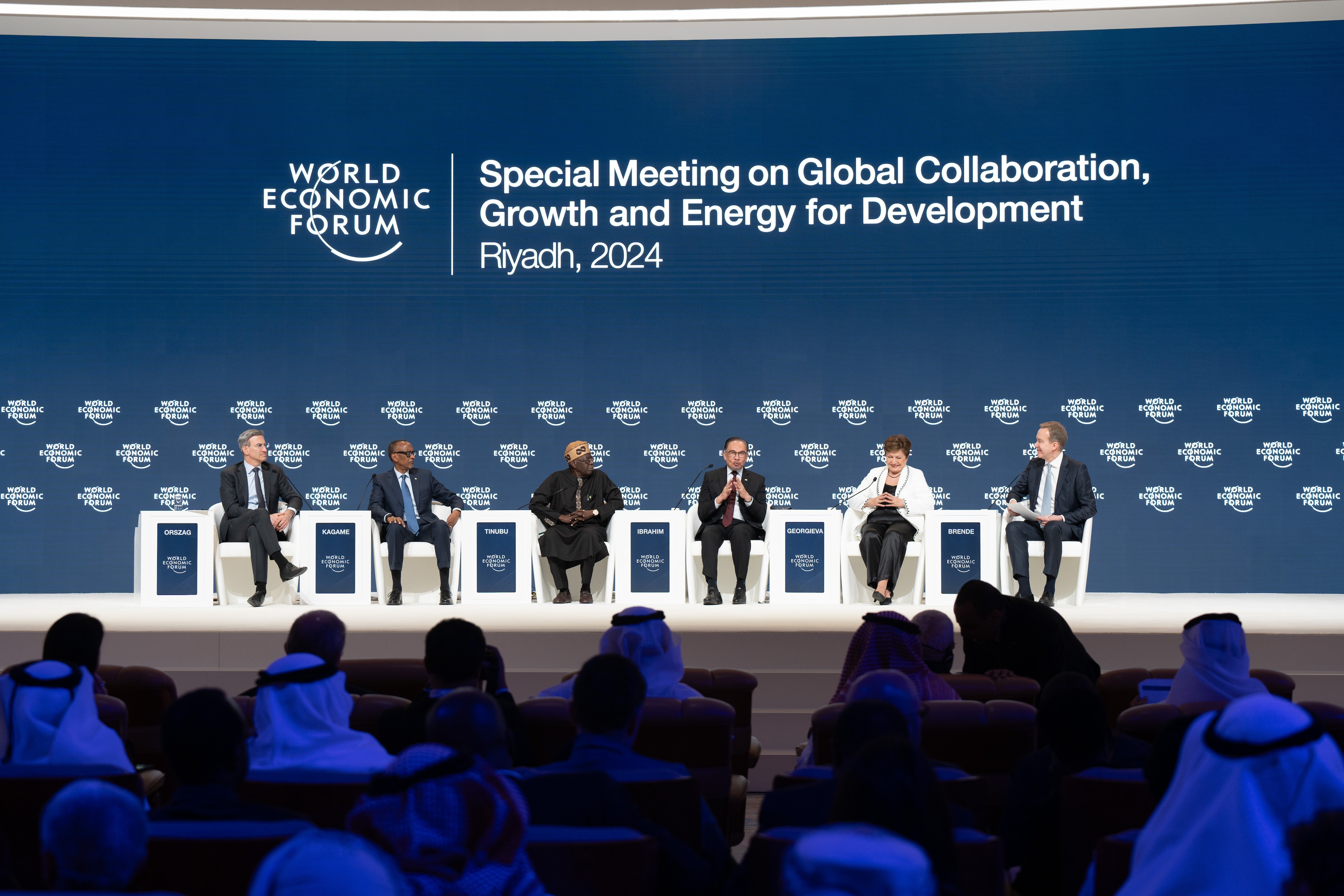How governments can shape markets towards green and inclusive growth

"The stakes are clear: the world needs to change quickly." Image: Jordan Wozniak/Unsplash

Get involved with our crowdsourced digital platform to deliver impact at scale
Stay up to date:
Davos Agenda
- Global leaders face questions about the immediate economic recovery, as well as assumptions that drove global economic relations for decades.
- Governments must actively shape markets towards green and inclusive growth, we argue in a new World Economic Forum paper Building Back Broader: Policy Pathways for a Post-Pandemic Transformation.
- Read the paper here.
For over 30 years, global development has been guided by a set of economic assumptions that encouraged countries to pursue economic growth through privatization of key sectors, cuts to public expenditures and a reduction of tax burdens on corporations. Underlying this Washington Consensus, as it became known derisively especially after crisis in the 1990s, was a belief in the free market and the private sector’s ability to create the best economic outcomes for all.
Whatever consensus remained around these principles after the 2008 crisis, has been finished off for good by the COVID-19 pandemic and the ways governments in advanced economies moved aggressively to support private institutions.
As global leaders meet in the months ahead at the G7 and G20 meetings in Cornwall and Rome respectively, they will be forced to grapple not only with questions of immediate economic recovery but also the lingering assumptions that drove global economic relations for decades. To make decisions that will ensure fairer access to vaccines globally and a long-term economic transformation that establishes more resilient, equitable and sustainable world, world leaders will need to re-think these assumptions about how value is produced and governed in our economies and reimagine what can be in the years ahead .
As chairs of the Global Future Council on the New Agenda for Economic Growth and Recovery, convened by the World Economic Forum, we argue in Building Back Broader: Policy Pathways for a Post-Pandemic Transformation that governments must actively shape markets towards green and inclusive growth. The COVID-19 pandemic and the ensuing vaccine development and vaccination sprint have sharply highlighted the importance of having a dynamic public sector and stronger, more symbiotic public-private partnerships, with common “missions” for shaping the economy.
There is a shared interest and common cause need to increase investment in research and innovation, scale sustainable and inclusive technologies and solutions, and rethink the balance of value that the public and private sector generate for society – to make sure much of the knowledge generated remains open as a public good.
In the paper, we emphasize that changing course fundamentally requires a market-shaping and market co-creating lens, not a market-fixing one. That means that all tools that governments have at their disposal, from procurement policy to grants loans and the use of public funds like development banks, must be used to direct the economy towards a growth path of inclusion and sustainability. This is not about market vs. the state but about the nexus where business, the state and other actors can come together can solve the biggest problems of our time, from climate change to weak health systems.
Today’s triple crises—economic, climate and health—must be a massive wake up call.
”The stakes are clear: the world needs to change quickly. The COVID-19 pandemic revealed the weaknesses in global health systems - from the lack of manufacturing capacity to provide front-line health workers with the most basic personal protection equipment to the missed opportunities to deploy an active testing and tracing system that could have bent the curve of this pandemic early on - and finally the failure to build an ambitious and well-resourced global vaccine programme to achieve the necessary immunity to help the entire world emerge from this pandemic together.
The inequitable vaccine effort is a useful case study of what works and what doesn’t. On the one hand we have had an extraordinary amount of public financing deployed toward the rapid development of the vaccine: close to US$10.5bn from different governments have been poured into the research and manufacturing of leading vaccine candidates developed by American and European companies, including Johnson & Johnson, Pfizer/BioNTech, Novavax and Moderna.
On the other hand, vaccine nationalism and inequitable distribution has left only 2.1% of the population in Africa, 20% in Asia and 26% in South America vaccinated to date. This is morally, economically, and medically problematic – posing risks to the vaccinated and unvaccinated alike of new outbreaks and economic slowdowns. As we have argued, the IMF should issue a round of its Special Drawing Rights, or SDRs this year, and wealthier countries should work to ensure some of this liquidity is used to fund the vaccination campaign.
The case of the COVID-19 vaccines shows the importance developing and sharing the knowledge and technologies that are necessary to address global challenges, including future pandemics, climate change, aging and inequality. Like vaccines, these public goods could include decarbonization technology, pandemic prevention technology and more.
In addition, the world needs to actively invest in public education, public health, public transport and other parts of our social and physical infrastructures that build the resilience in our economies so that when pandemics break out, we are better prepared. As Nick Stern argued with climate change, it costs less to make the needed investments today – strengthen the path of inclusive and sustainable growth – than pick up the pieces later.
This requires an outcomes-based view of our financial systems. Instead of handing out money for recovery bailouts, we should seek to transform the economy through conditionalities included with public funds that push companies to improve working conditions, reduce carbon emissions, and reverse the last decades of value extraction through the excessive use of share buybacks.
Finally, we must remember that the economic transformation we seek requires investing today to build the markets of tomorrow that can help address societal and environmental challenges. This means a view of industrial strategy that is focused on solving problems rather than making lists of "key sectors." Our paper dedicates a section to patient finance for innovation and technological transfer through vehicles such as national development banks, sovereign wealth funds, and innovation funds that specialize in provision of long-term funding. Such funds must be conditional on sectors transforming themselves, including long-time sectors like steel and cement making that must find ways to reduce their material content over the next years.
Indeed, the notion of stakeholder value is critical here. Understanding how government funds can interact with business investment to produce value in a fundamentally different way is much more important than any efforts around corporate social responsibility or philanthropic giving. Given how long many wealthy countries have industrialized with little concerns for negative externalities, they must now responsibly develop the capacity in countries to transform their economies to be more sustainable.
The world should learn from this crisis and better implement these hard-earned lessons than it did after the 2008 financial crisis. The COVID-19 vaccine development shows the potential of a dynamic public sector that works with businesses to shape new markets and solve common “missions”, but also the risks and shortcomings of current structures and collaboration regimes. People from around the world are asking governments to invest today in the solutions that will help us address climate change, inequality, aging and future health challenges. Achieving these ends, and many others, will require not only new investments but a new approach to market creation.
Today’s triple crises—economic, climate and health—must be a massive wake up call. To do better in the years ahead, we must integrate the idea of better into every funding tool and form of partnership in the global economy—from how we structure our budgets to how we govern intellectual property rights, from how we foster partnerships for a greener economy to how we implement true solidarity between developed and developing countries. If we fail (again), we may not have another chance.
Don't miss any update on this topic
Create a free account and access your personalized content collection with our latest publications and analyses.
License and Republishing
World Economic Forum articles may be republished in accordance with the Creative Commons Attribution-NonCommercial-NoDerivatives 4.0 International Public License, and in accordance with our Terms of Use.
The views expressed in this article are those of the author alone and not the World Economic Forum.
Related topics:
The Agenda Weekly
A weekly update of the most important issues driving the global agenda
You can unsubscribe at any time using the link in our emails. For more details, review our privacy policy.
More on Forum InstitutionalSee all
Gayle Markovitz
April 28, 2024
Gayle Markovitz
April 27, 2024
Mirek Dušek and Maroun Kairouz
April 27, 2024
Kate Whiting
April 26, 2024
Spencer Feingold and Gayle Markovitz
April 19, 2024
Kate Whiting
April 17, 2024







